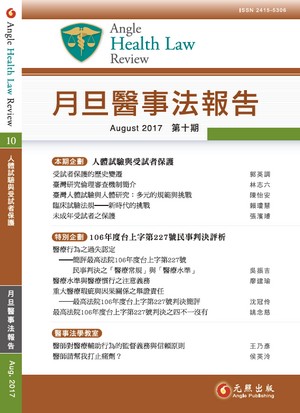醫療行為之過失認定──簡評最高法院106年度台上字第227號民事判決之「醫療常規」與「醫療水準」【特別企劃】 試閱
The Determination of Medical Negligence: A Brief Comment on the "Medical Customs" and "Medical Level" in a Supreme Court Judgment
臺灣法院向來常以醫師之醫療行為是否違反「醫療常規」作為認定過失存否之依據,其判斷標準與以往英美法所採之「醫療慣例」注意標準類似;惟近年臺灣法院已漸有區分「醫療常規」及「醫療水準」之差異,而以概念上近似英美法「理性醫師」注意標準之「醫療水準」作為醫療過失之認定基準,此一發展趨勢,應值贊同。本件最高法院106年度台上字第227號民事判決(部分節錄)謂:「醫師為具專門職業技能之人,其執行醫療之際,應盡善良管理人之注意義務,就醫療個案,本於診療當時之醫學知識,審酌病人之病情、醫療行為之價值與風險及避免損害發生之成本暨醫院層級等因素,綜合判斷而為適當之醫療,始得謂符合醫療水準而無過失;至於醫療常規,為醫療處置之一般最低標準,醫師依據醫療常規所進行之醫療行為,非可皆認為已盡醫療水準之注意義務」,對於此一概念作出更為清楚之闡述,值得臺灣學界及實務界注意。
In medical malpractice suits, many courts around the world, including those in Taiwan, used to adopt the “medical customs” as the standard of care to judge the presence of negligence. However, in the common law system, currently the courts are using the “reasonable physician” standard, instead of “medical customs,” to determine professional negligence in medical litigations. A similar trend could also be observed in Taiwan: more and more courts in Taiwan are trying to differentiate between the “medical customs” and the “medical level,” a term adopted from the Japanese medical law which is conceptually close to the “reasonable physician” standard in the common law system. Recently, a landmark judgment of the Supreme Court in Taiwan reaffirmed that medical negligence should be determined according to the “medical level” rather than the “medical customs”.
069-085






